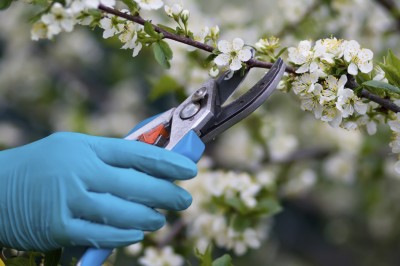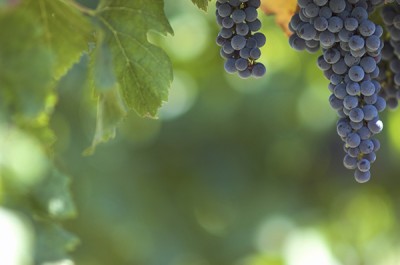Horticulture

The Ornamental Horticulture discipline examines the art and science of cultivating plants. The Horticulture program at MiraCosta also includes sustainable design, installation, and maintenance of landscapes, floral design, nursery and organic crop production, and wine technology. Students take horticulture courses to prepare for the major, complete job-related certificates, earn continuing education units (CEUs) for professional licenses, and fulfill general education requirements. Career options include florist and nursery-industry work, urban agriculture, landscape architecture, irrigation design and water management, landscape design, landscape installation and management, golf and sports turf management, urban forestry, horticulture sales and services, grove and vineyard management, and winemaking.
Contact Information
|
Chair: Karen Smith Dean: Al Taccone |
Department: Horticulture and Hospitality Office: Building OC4800, 760.795.6811 |
Full-Time Faculty
|
Megan Allison Claire Ehrlinger |
Associate Degrees
Degree programs include the completion of a general education (GE) pattern of courses. The knowledge, skills, and abilities gained as a result of completing general education, referred to as GE outcomes, can be viewed here .
Associate in Arts Degrees
Landscape Architecture
Sustainable Landscape and Turf Management
Nursery/Horticulture Crop Production
Students may earn one of the above-named associate degrees by completing a certificate of achievement and the general education courses required for MiraCosta College's Associate in Arts degree (see Associate Degrees ). Students earning an associate degree in Landscape Architecture are eligible to take the Landscape Architecture Registration Exam to achieve state licensure after completing requisite apprenticeship. Students should meet with a MiraCosta counselor to identify required courses and to develop a written educational plan for the specific degree or certificate they wish to earn.
Certificates
 Certificate programs prepare students for state, county, and city employment in most areas of landscape management, such as park and grounds supervision and state or county agriculture inspection. In the private sector, graduates find jobs in agri-sales and services, organic food production, retail and wholesale nurseries and greenhouses, landscape and irrigation design, landscape contracting, and water management. Any of these majors may be completed in three semesters and one or two summer sessions by students who attend full-time.
Certificate programs prepare students for state, county, and city employment in most areas of landscape management, such as park and grounds supervision and state or county agriculture inspection. In the private sector, graduates find jobs in agri-sales and services, organic food production, retail and wholesale nurseries and greenhouses, landscape and irrigation design, landscape contracting, and water management. Any of these majors may be completed in three semesters and one or two summer sessions by students who attend full-time.
Certificate of Achievement
Landscape Architecture
This certificate is designed to provide employable technical skill training in the field of professional residential landscape design development. It also provides a foundation for students who plan to enter a college of landscape architecture.
Program Student Learning Outcome Statement:
- Upon completion of this program, the student will be able to use hand drawn and computer-generated graphics to produce accurate landscape plans that reflect sustainable, functional, and aesthetic principles.
| Required courses: | ||
| DESN 101 | Computer-Aided Design and Drafting | 4 |
| DESN 102 | Architectural Drawing | 3 |
| HORT 117 | Plant Identification: Trees, Shrubs, and Vines | 3 |
| HORT 126 | Landscape Irrigation | 3 |
| HORT 127 | Landscape Design | 3 |
| HORT 128 | Landscape Construction | 3 |
| HORT 220 | Computer-Aided Landscape Design Applications | 3 |
| HORT 230 | Landscape Architecture | 3 |
| Select one course from the following electives: | 2-4 | |
| Architectural Communications | ||
| Architectural Design I | ||
| Introduction to Sustainable Horticulture | ||
| Soil Science | ||
| Occupational Cooperative Work Experience | ||
| Total Units | 27-29 | |
Certificate of Achievement
Sustainable Landscape and Turf Management
This certificate prepares students for employment in the California horticulture and landscape contracting industries by providing practical, hands-on experience and preparation for the Certified Arborist, Landscape Contracting (C-27) and pesticide licenses.
Program Student Learning Outcome Statement:
- Upon completion of this program, the student will be able to inventory, analyze, and recommend an efficient management plan for the turf, trees, shrubs, and landscape elements of a landscape.
| Required courses: | ||
| HORT 110 | Introduction to Sustainable Horticulture | 3 |
| HORT 115 | Soil Science | 3 |
| HORT 117 | Plant Identification: Trees, Shrubs, and Vines | 3 |
| HORT 118 | Arboriculture | 3 |
| HORT 121 | Sustainable Landscape and Turf Management | 3 |
| HORT 126 | Landscape Irrigation | 3 |
| HORT 127 | Landscape Design | 3 |
| HORT 128 | Landscape Construction | 3 |
| HORT 134 | Integrated Pest Management | 3 |
| Select at least 3 units from the following courses: | 3-4 | |
| Basic Motorcycle Maintenance and Small Engine Repair | ||
| Small Business Management | ||
| Entrepreneur I and Entrepreneur II | ||
| Plant Science | ||
| Internship Studies * | ||
| Occupational Cooperative Work Experience * | ||
| Elementary Spanish (First Semester) | ||
| Total Units | 30-31 | |
| * |
Certificate of Achievement
Nursery/Horticulture Crop Production
This certificate provides students with the practical, hands-on experience they need to pursue employment in the areas of plant production, maintenance, or sales of ornamental and/or food crops in California.
Program Student Learning Outcome Statement:
- Upon completion of this program, the student will be able to integrate concepts and skills learned in core courses to manage environmental and other growth factors to produce healthy and marketable crops.
| Required courses: | ||
| HORT 115 | Soil Science | 3 |
| HORT 116 | Plant Science | 4 |
| HORT 117 | Plant Identification: Trees, Shrubs, and Vines | 3 |
| HORT 134 | Integrated Pest Management | 3 |
| HORT 140 | Subtropical Fruit and Plant Production | 3 |
| HORT 144 | Nursery Management and Production | 3 |
| Select one course from the following electives: | 1.5-4 | |
| Sensory Analysis of Wines | ||
| Wines of California | ||
| Introduction to Wine Production | ||
| Vineyard Production and Management | ||
| Internship Studies * | ||
| Occupational Cooperative Work Experience * | ||
| Elementary Spanish (First Semester) | ||
| Total Units | 20.5-23 | |
| * | HORT 292 and HORT 299 may be taken for a maximum of 3 units. |
Certificate of Proficiency
Irrigation Technology
This certificate is designed to teach the theory, design, and installation of irrigation systems including the materials, installation practices, maintenance, crew management, and operations of a landscape irrigation business. The program emphasizes residential and large-scale irrigation system installation and water management.
Program Student Learning Outcome Statement:
- Upon completion of the program, students given planting areas of various sizes, shapes and plant materials will be able to select appropriate irrigation equipment in accordance with best management practices.
| Required courses: | ||
| DESN 101 | Computer-Aided Design and Drafting | 4 |
| HORT 121 | Sustainable Landscape and Turf Management | 3 |
| HORT 126 | Landscape Irrigation | 3 |
| HORT 128 | Landscape Construction | 3 |
| Total Units | 13 | |

Certificate of Proficiency
Wine & Viticulture Technology
The Wine and Viticulture Technology Certificate cross-trains students for work in the wine production, wine sales, and viticulture areas.
Program Student Learning Outcome Statement:
- Upon completion of this program, students will be able to integrate concepts and skills learned in core courses to schedule the production steps of quality wines from grape to glass.
| Required courses: | ||
| HORT 115 | Soil Science | 3 |
| HORT 145 | Sensory Analysis of Wines | 3 |
| HORT 147 | Wines of California | 3 |
| HORT 148 | Introduction to Wine Production | 1.5 |
| HORT 149 | Vineyard Production and Management | 3 |
| Total Units | 13.5 | |
How to Read Course Descriptions
For more detailed information about a course, such as its content, objectives, and fulfillment of a degree, certificate, or general education requirement, please see the official course outline of record, available at http://www.miracosta.edu/governance/coursesandprograms/courseoutlines.html.
Courses
HORT 110: Introduction to Sustainable Horticulture
Units: 3
Prerequisites: None
Acceptable for Credit: CSU
Lecture 2 hours, laboratory 3 hours. (0109.00)
Course Typically Offered: F, SP, SU
This course introduces sustainable horticulture principles and practices in gardening, landscaping, nursery management, and floriculture. Topics include basic botany, cultural practices, propagation, structures and layout, pest management, planting, container gardening and houseplants, floral design, plant identification, and career opportunities. Students are required to attend field labs and field trips.
HORT 115: Soil Science
Units: 3
Prerequisites: None
Acceptable for Credit: CSU, UC
Lecture 2 hours, laboratory 3 hours. (0103.00)
Course Typically Offered: F, SP
This course examines the physical, chemical, and biological properties of soil and covers soil conditions that restrict plant growth. Students learn to solve soil problems that may exist in the field, greenhouse, and landscape with a focus on sustainable practices. The course emphasizes problem-solving techniques that apply to Southern California soils, including fertility, salinity, pH, high calcium, specific toxicities, and physical problems. Students are required to participate in field labs and trips.
HORT 116: Plant Science
Units: 4
Prerequisites: None
Acceptable for Credit: CSU, UC
Lecture 3 hours, laboratory 3 hours. (0103.00)
Course Typically Offered: F, SP, SU
This introductory course offers students an opportunity to learn the basic principles of plant science pertaining to food and ornamental plants. The course emphasizes plant morphology, anatomy and function, plant physiology, reproduction, biotic and abiotic environmental factors that impact plant growth and development, plant-soil-climate interrelationships, plant taxonomy and nomenclature, and plant diversity and adaptations. Learning activities include plant studies in the field, greenhouse, and landscape. Students are required to attend field labs and field trips.
HORT 117: Plant Identification: Trees, Shrubs, and Vines
Units: 3
Prerequisites: None
Acceptable for Credit: CSU, UC
Lecture 2 hours, laboratory 3 hours. (0109.00)
Course Typically Offered: F, SP
This course covers the identification, growth habits, culture, and ornamental use of plants found in Southern California landscapes. Topics include botanical and common names, plant family relationships, and environmental adaptations. Students learn to identify by sight memory 200 plants from certification test and local plant lists. Students are required to attend field trips both on and off campus.
HORT 118: Arboriculture
Units: 3
Prerequisites: None
Acceptable for Credit: CSU
Lecture 3 hours. (0199.00)
Course Typically Offered: F
This course introduces the care and management of landscape trees in urban settings. It covers soil, water, and nutrient management, integrated pest management, and tree biology. Topics include tree selection, protection, fertilization, pruning basics, urban forest management, safety, and risk management. This course prepares students for the International Society of Arboriculture (ISA) Certification exam and provides ISA Continuing Education Units (CEUs). Field trips are required.
HORT 121: Sustainable Landscape and Turf Management
Units: 3
Prerequisites: None
Acceptable for Credit: CSU
Lecture 2 hours, laboratory 3 hours. (0109.10)
Course Typically Offered: SP
This course introduces landscape ecosystems and emphasizes sustainable management practices of turfgrass, trees, and landscape plantings. Students learn best management practices, including soil preparation, nutrient management, irrigation, mowing, pruning and growth control, integrated pest management, and fire safety. Students practice basic skills needed for successful maintenance of landscaped areas in accordance with sustainable and ecological principles. Participation in field trips and field labs is required.
HORT 126: Landscape Irrigation
Units: 3
Prerequisites: None
Acceptable for Credit: CSU
Lecture 2 hours, laboratory 3 hours. (0109.10)
Course Typically Offered: F
This course introduces the design, installation, and maintenance of a water efficient landscape irrigation system. Topics include water supply, basic hydraulics, climate, soil and plant characteristics, component identification and terminology, and pipe sizing as well as types of sprinklers, valves, and controllers.
HORT 127: Landscape Design
Units: 3
Prerequisites: None
Acceptable for Credit: CSU, UC
Lecture 2 hours, laboratory 3 hours. (0109.10)
Course Typically Offered: F, SP
This course introduces the principles and practices of landscape design. Topics include the principles and process of design, drafting, hand drawn graphics, and presentation methods. Projects emphasize residential and small commercial sites. Students are required to attend field trips.
HORT 128: Landscape Construction
Units: 3
Prerequisites: None
Acceptable for Credit: CSU
Lecture 2 hours, laboratory 3 hours. (0109.10)
Course Typically Offered: F
This course introduces the fundamentals of landscape construction. Topics include soil preparation, paving and construction materials, hand and power tool use, turf and plant installation, plan reading, estimating, and bid preparation. The course also covers local codes, state requirements, and employment opportunities. It prepares students to pass the C-27 Landscaping Contractor's License exam. Students are required to attend field trips.
HORT 134: Integrated Pest Management
Units: 3
Prerequisites: None
Acceptable for Credit: CSU
Lecture 2 hours, laboratory 3 hours. (0109.00)
Course Typically Offered: SP
This course examines the common pests that invade ornamental plantings and nursery crops in Southern California, including weeds, invertebrate pests, and plant diseases. Students learn to diagnose pest problems and design solutions to these problems based upon an integration of approved pest management techniques and practices including cultural, biological, mechanical/physical, and chemical control methods. This course is designed to assist students in preparing for California licensing exams in pest management or to earn continuing education hours to maintain their license.
HORT 140: Subtropical Fruit and Plant Production
Units: 3
Prerequisites: None
Acceptable for Credit: CSU
Lecture 2 hours, laboratory 3 hours. (0109.00)
Course Typically Offered: F, SP
This course examines the principles and practices involved in subtropical fruit and plant production, such as citrus and avocados. Topics include propagation, site selection, planting, fertilization, irrigation, and pest control. The course also covers harvest techniques, marketing, and industry economic trends. Field trips to local orchards and groves are required.
HORT 144: Nursery Management and Production
Units: 3
Prerequisites: None
Acceptable for Credit: CSU
Lecture 2 hours, laboratory 3 hours. (0109.30)
Course Typically Offered: F
This course analyzes the operation and management of plant nursery facilities and personnel, including cultural practices, scheduling of nursery crops, marketing, and legal and environmental issues. Students examine the relationships of light, temperature, moisture, humidity, and fertility as well as their impact on plant production. Topics include pruning, transplanting, propagation, and pest control methods. Students are required to attend field trips to local nurseries.
HORT 145: Sensory Analysis of Wines
Units: 3
Prerequisites: None
Acceptable for Credit: CSU, UC
Lecture 3 hours. (0104.00)
Course Typically Offered: TBA
This course surveys the history and development of winemaking, detailing the grape varieties produced in the major wine-producing regions of the world. Topics include the influence of climate and soil; wine fermentation, handling, storage, and bottling methods; and wine disorders. Students learn organoleptic tasting techniques to differentiate among the characteristics and styles of various wines. Students must be 21 years old to enroll and they are required to attend field trips to local wineries.
HORT 147: Wines of California
Units: 3
Prerequisites: None
Acceptable for Credit: CSU
Lecture 3 hours. Course Typically Offered: TBA
This course introduces the wines and major wine producing regions of California. It covers history, viticultural practices, winemaking styles, and sensory evaluation techniques of representative California wines. Students must be 21 and are required to attend field trips.
HORT 148: Introduction to Wine Production
Units: 1.5
Prerequisites: None
Acceptable for Credit: CSU
Lecture 1 hour, laboratory 1.50 hours. (0104.00)
Course Typically Offered: TBA
This course provides beginning winemakers with basic how to instructions and advanced technical training on aspects of winemaking. It emphasizes the importance of specialized backgrounds needed to solve the wide variety of problems encountered in commercial wine production. Students must be 21 and are required to attend field trips.
HORT 149: Vineyard Production and Management
Units: 3
Prerequisites: None
Acceptable for Credit: CSU
Lecture 2 hours, laboratory 3 hours. (0104.00)
Course Typically Offered: TBA
This course covers responsibilities of vineyard management. Topics include climate zones, soil selection, financing, farm organization, irrigation systems, field layout, varietal selection, nutritional needs, harvesting, labor management, marketing, and budgeting. Students are required to attend field trips to local vineyards.
HORT 220: Computer-Aided Landscape Design Applications
Units: 3
Prerequisites: None
Enrollment Limitation: Not open to students with credit in HORT 129.
Acceptable for Credit: CSU
Lecture 2 hours, laboratory 3 hours. (0109.00)
Course Typically Offered: F
This course introduces the application of computer-based design software packages, including image manipulation, modeling, multimedia, and drafting combined with hand graphics for the development of landscape plans, perspectives, elevation drawings, and presentation graphics.
HORT 230: Landscape Architecture
Units: 3
Prerequisites: HORT 127.
Acceptable for Credit: CSU
Lecture 2 hours, laboratory 3 hours. (0109.10)
Course Typically Offered: SP
This project-based class offers continued study in the field of landscape architectural design. It emphasizes site analysis, sensory evaluation, sustainable design principles, cost considerations, rendering, site details, model building, and oral presentation. Students work both individually and in groups on projects at the urban and community scale, and they are required to attend field trips.
HORT 292: Internship Studies
Units: 0.5-3
Prerequisites: None
Corequisite: Complete 75 hrs paid or 60 hrs non-paid work per unit.
Enrollment Limitation: Instructor, dept chair, and Career Center approval. May not enroll in any combination of cooperative work experience and/or internship studies concurrently.
Acceptable for Credit: CSU
Course Typically Offered: TBA
This course provides students the opportunity to apply the theories and techniques of their discipline in an internship position in a professional setting under the instruction of a faculty-mentor and site supervisor. It introduces students to aspects of the roles and responsibilities of professionals employed in the field of study. Topics include goal-setting, employability skills development, and examination of the world of work as it relates to the student's career plans. Students must develop new learning objectives and/or intern at a new site upon each repetition. Students may not earn more than 16 units in any combination of cooperative work experience (general or occupational) and/or internship studies during community college attendance.
HORT 296: Topics in Horticulture
Units: 1-3
Prerequisites: None
Acceptable for Credit: CSU
Lecture 1 hour.
Lecture 2 hours.
Lecture 3 hours. (0109.00)
Course Typically Offered: TBA
This course gives students an opportunity to study topics in Horticulture that are not included in regular course offerings. Each Topics course is announced, described, and given its own title and 296 number designation in the class schedule.
HORT 299: Occupational Cooperative Work Experience
Units: 1-4
Prerequisites: None
Corequisite: Complete 75 hrs paid or 60 hrs non-paid work per unit.
Enrollment Limitation: Career Center approval. May not enroll in any combination of cooperative work experience and/or internship studies concurrently.
Acceptable for Credit: CSU
Course Typically Offered: TBA
Cooperative Work Experience is intended for students who are employed in a job directly related to their major. It allows such students the opportunity to apply the theories and skills of their discipline to their position and to undertake new responsibilities and learn new skills at work. Topics include goal-setting, employability skills development, and examination of the world of work as it relates to the student's career plans. Students may not earn more than 16 units in any combination of cooperative work experience (general or occupational) and/or internship studies during community college attendance.





